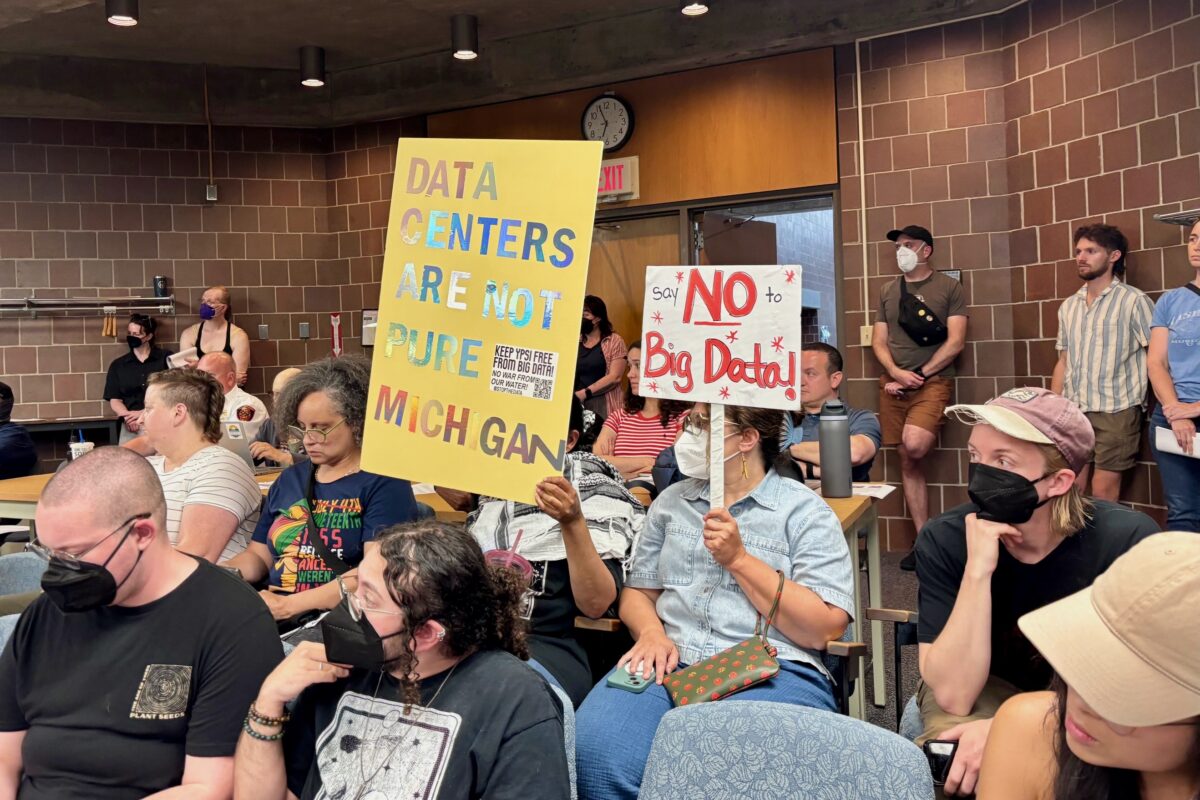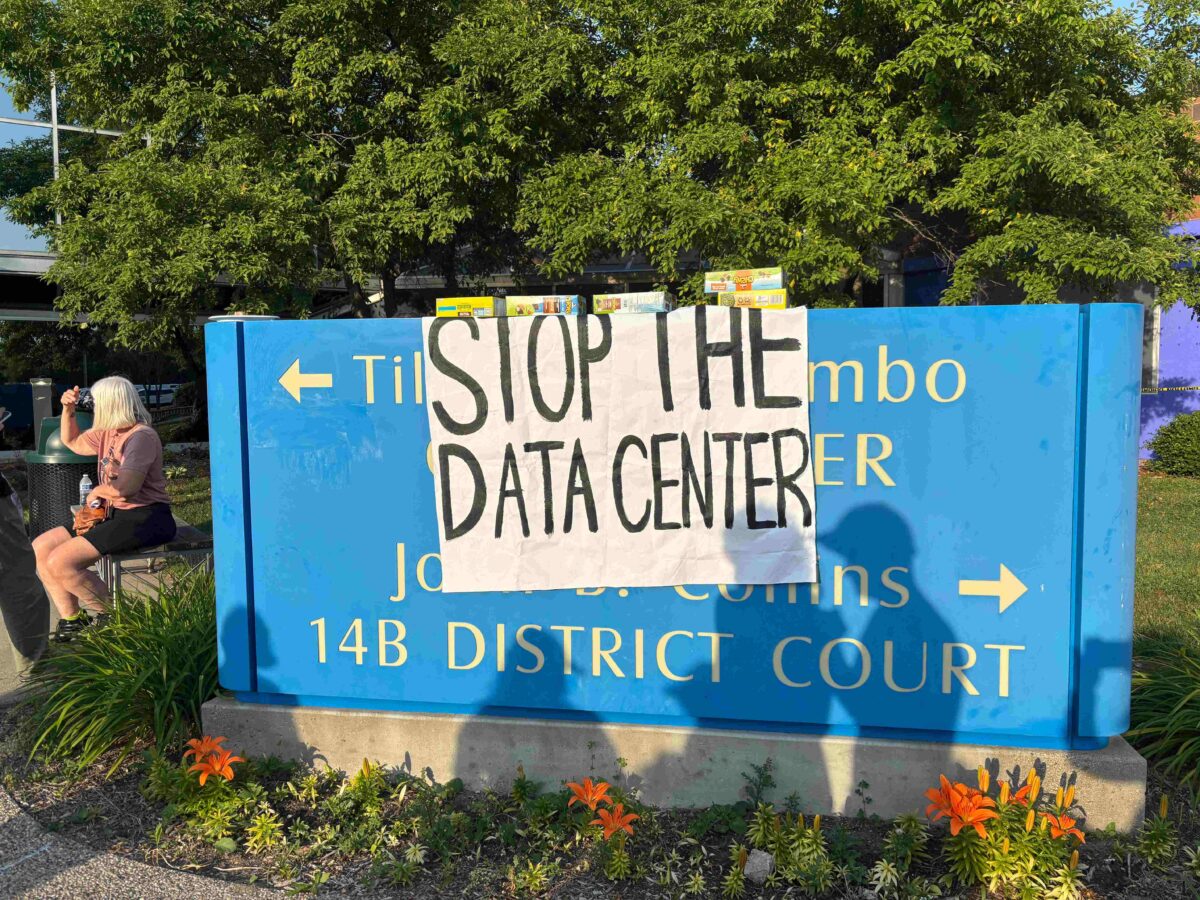Overview:
-"I do not trust U of M," Ypsilanti Township Supervisor Brenda Stumbo says in email about $1.2 billion data center project.
-Township attorney says "extravaganza project" will cost the township in the form of municipal services.
-The school is exempt from paying taxes, and Stumbo says the township has requested funding for police and fire services.
The University of Michigan’s efforts to build a $1.2 billion data center south of Ypsilanti are being met with resistance by local officials, with Ypsilanti Township Supervisor Brenda Stumbo pushing back strongly on the project.
The university misled the township about the size of the project, Stumbo said in a June 26 email to a concerned resident that was shared by the group Stop the Data Center. Deputy Supervisor Elizabeth Reyher authenticated the email in a phone interview with Planet Detroit.
Stumbo said she would work to stop what she called the “big bad data center,” expressing concern it could generate noise and vibrations and affect habitat and wildlife in and around the nearby Huron River.
“I have learned as Supervisor they (University of Michigan) are not to be trusted and do not do what is best for community, the people or the environment,” Stumbo wrote in the email. “They do what is best for them and their money grabbing purchase of land should scare the hell out of all elected officials in the State.”
Under state law, the University of Michigan and other public universities are exempt from securing permits or approval from local governments and are not required to pay local taxes, Stumbo told Planet Detroit in a Wednesday email.
U of M plans to build two data centers in partnership with Los Alamos National Laboratory just south of the Huron River’s Ford Lake Dam in Ypsilanti Township.
The $1.2 billion project is for artificial intelligence research, including both classified and non-classified elements, according to the university. Los Alamos primarily provides scientific and engineering support for national security programs, according to the Department of Energy, which owns the lab.
The Michigan Economic Development Corp., which administers grants approved by state lawmakers, provided $100 million in funding for the project.
Untaxed data center could cost residents
Ypsilanti-area residents are protesting the data center, raising concerns about the power and water-hungry project’s potential to harm the Huron River, increase water and electricity rates, and possibly support drone warfare and surveillance technology.
Data center energy demands have kept coal generation online in other states. And the facilities can use millions of gallons of water a day to cool servers, The Washington Post reports.
The university didn’t directly answer questions about the project and directed Planet Detroit to its frequently asked questions webpage. The site states the facility will “employ integrated design principles to ensure energy efficiency, water conservation, occupant comfort and minimal environmental impact to the project site.”
The webpages says: “in keeping with the university’s carbon neutrality goals, the project will be all-electric.”
Other communities have reaped millions of dollars in property taxes from data centers. In contrast, the University of Michigan’s exemption from property taxes — while at the same time receiving $100 million in public funding for the data center project — has angered public officials.
The data center project could incur costs for the township’s police and fire departments without providing them with additional funding, said Doug Winters, legal counsel for Ypsilanti Township. Winters said he spoke with Planet Detroit about the data center project in his personal capacity.
“They want to come into the community, do this extravaganza project, and not pay one dime for police, fire, and other municipal services,” he said, noting the University of Michigan is one of the wealthiest universities in the nation.
U.S. Rep. Debbie Dingell (D-Ann Arbor) told Planet Detroit she is concerned about several aspects of the project, with her biggest issue being the lack of support for the police and fire departments.
“The security of this site is critical, and the township cannot be expected to take on that burden,” she said. “Given its relationship to (the Department of Energy), I am asking many questions.”
Although the school is exempt from paying taxes, Stumbo told Planet Detroit the township has requested funding for police and fire department services as part of the project.
MORE REPORTING FROM PLANET DETROIT
Ypsilanti Township residents speak out against University of Michigan’s ‘biggest, baddest’ data center
In Ypsilanti Township, residents are sounding alarms over a $1.2 billion data center project by the University of Michigan and Los Alamos National Laboratory, citing fears of rising utility costs, environmental harm, and the advancement of surveillance technologies.
What does AI mean for Michigan’s environment?
Michigan’s tax breaks for data centers may raise energy costs, increase water usage and jeopardize the state’s climate plan as AI technology advances.
Whitmer signs data center bill, utility regulator worries about stranded assets
Governor Whitmer has signed a use tax exemption for large data centers in Michigan, potentially attracting wealthy companies to the state. Environmental advocates warn that the high water and energy demands of these facilities could undermine state climate goals and raise residents’ utility bills.
‘Misled’ by U of M, township supervisor says she’ll fight project
A U of M representative called Stumbo the day before it announced the project, she said in the email. The university purchased 26 acres of land and committed to providing community benefits and creating 200 jobs in an area on Textile Road, which is zoned for light manufacturing, according to Stumbo.
“I do not trust U of M, they misled me and the Township in the first zoom call for the 26 acres of flat land and then called the second time before announcing the second purchase of over 100 acres,” the email states.
Stumbo said she did not anticipate the purchase of an additional 100 acres and the township has “no information” about the size of the facility.
The University of Michigan did not comment on the statements by the Ypsilanti Township supervisor.
Although the township lacks the power to stop the data center development through the zoning process, several other agencies will need to sign off on the project, according to Stumbo’s email.
The Department of Energy has not yet approved the Ypsilanti Township site, she wrote in the email.
The project will likely also need approval from the Michigan Department of Environment, Great Lakes, and Energy; DTE Energy; the Ypsilanti Township Fire Department; Washtenaw County Road Commission; and Ypsilanti Community Utilities Authority, Stumbo said.
Luke Blackburn, executive director for YCUA, the municipal utilities department, told Planet Detroit the project will need to obtain permits for public water mains and wastewater utilities through EGLE.
The YCUA may need to issue an additional wastewater discharge permit, but the utility has so far only been provided with “limited, partial drawings or plans” for the project, he said.
Los Alamos directed Planet Detroit to U of M with questions about the data center project.
A DTE spokesperson said the utility has been “working with U of M to understand their energy needs” and suggested reaching out to U of M for specifics on its projects.
Representatives for the Department of Energy did not respond to questions from Planet Detroit.
The Washtenaw County Road Commission said it has not received permit applications. EGLE spokesperson Dale George declined to comment on what permits may be needed until the agency receives an application.
A township trustee is preparing a letter to send to state and congressional representatives to ask for help in stopping the approval of the project, Stumbo’s email says. She warned that other data centers are looking to locate in the area and guardrails were needed to limit sound and vibration and protect wildlife and habitat.
“U of M Ann Arbor is harming our future and quality of life by a mega data center in which they do not have to be accountable to anyone.”





